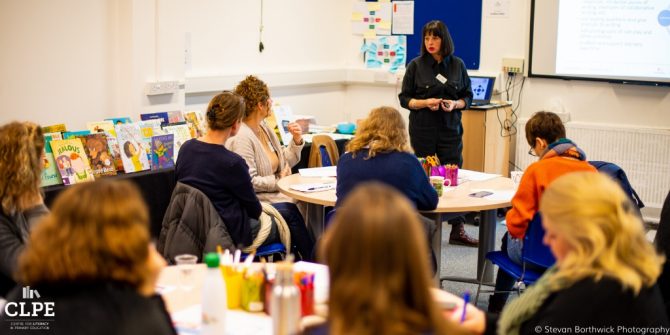Bring the Power of Reading to your school
- Supporting schools to build a curriculum based on high quality children’s literature
- Developing creative approaches to the teaching of reading and writing
- Engaging children in a love of reading, inspiring children as writers
Background
The Centre for Literacy in Primary Education (CLPE) is an independent UK charity dedicated to raising the literacy achievement of children by putting quality literature at the heart of all learning. Established in 1972, our knowledge and expertise is rooted in a rich history and we continue to lead current thinking and practice in the teaching of literacy in primary schools. We provide a wide range of professional literacy training at our Centre in London and across the country.
CLPE’s research around the importance of using quality texts as the basis for English planning and quality teaching and to provide reflective professional development is embodied in our flagship training programme, The Power of Reading.
Teachers on the Power of Reading training programme attend focussed training days and receive a pack of high quality books. Their whole school has access to a website of resources where they can find teaching plans, information about pedagogical approaches and examples of practice.
Our Power of Reading website resources are also open to schools outside of the training, on a membership basis. This enables a greater range of schools to access planning for quality texts, which supports schools to teach the National Curriculum.
The numbers of schools and teachers on the programme continues to grow year on year as does the impact on teachers and children whose schools have participated in the training.

What is the Power of Reading?
The Power of Reading is a programme that supports quality English teaching throughout a primary school, with support for transition to secondary. It is built on extensive classroom based research into the effective teaching of English.
The training programme and teaching plans support schools to build a curriculum based on high quality children’s literature and improve the quality of English teaching by developing teacher’s knowledge of quality texts and creative approaches to the teaching of reading and writing.
The plans put quality children’s literature at the heart of English lessons and the texts and approaches used support schools in building a culture of Reading for Pleasure through recommendations for texts, ideas for enhancing the reading environment and ways to immerse children in the world of texts, engaging them in a love of reading and encouraging them to read more independently.
The teaching plans form the basis of a school’s English Curriculum and provide contextualised experiences of phonics, spelling and grammar as well as teaching key reading strategies and planned opportunities for a range of purposeful writing outcomes. Each sequence lasts between 3 and 6 weeks or between 15-30 English sessions. There are over 220 different sequences to choose from on the Power of Reading website. Example sequences for all year groups can be found on the free resources section of the CLPE website.
Each teaching unit is planned around a high quality text, chosen by our expert team of teachers and qualified children’s librarian. The texts are chosen to ensure children gain experience of a range and breadth of text type, authors, genres and models of language and build progressively from EYFS to Y6 in the complexity of language, themes and concepts.
“I have to say that the Power of Reading course changed the reading culture in my school. It was the first thing we did when I took on a failing school and it played a significant part in our turnaround. But most of all, it helped staff realise the importance of developing a love of reading.”
Alison Kriel, Education Consultant.
Sessions focus on teachers teaching reading and writing skills and strategies and children having the opportunity to use and apply this learning in their own independent work. The sequences cover the expectations of the National Curriculum and EYFS statutory framework and give plenty of opportunities and resource ideas for cross curricular links. They are planned to support children achieving age related expectations and beyond to working at greater depth.
Each teaching sequence will unfold the text slowly, to build key reading skills and strategies and develop children’s comprehension and understanding of language for effect. Simultaneously, these key approaches and the planned activities prepare the children for a range of purposeful writing outcomes throughout the sequence. The writing tasks are carefully planned to enable teachers and children to follow an authentic process for writing, building ideas and imagination, before drafting, responding to and editing work, prior to publication.
In March 2020, we developed our Take 5 home learning resources for schools to share with parents and carers as part of home learning. They are designed to allow children to develop their own responses to Power of Reading texts they may have studied or will be studying in school.
Each set of notes contains five simple activities which will develop children’s comprehension skills and strategies and develop their imagination and creativity for writing.

What impact does the Power of Reading make?
The programme has now run for 16 years, with extensive evidence of impact on engagement and attainment, particularly for disadvantaged groups.
Inspections of member schools highlight how the programme has supported schools to improve the quality of teaching and learning, with improvements seen in the quality of pupils reading and writing, the stretch of challenging texts and the impact the approaches make on children’s inference and deduction skills and breadth of vocabulary. Impact is also seen in children’s writing – their imagination, writing stamina and confidence in writing at length. This is evident for pupils of all abilities, not just for those working at expected levels and greater depth.
Our programme is regularly evaluated to ensure its impact on schools, teachers and children. Our latest independent evaluation was conducted by Leeds Trinity University. The full report, which is available on the Power of Reading website, found that, in Power of Reading schools:
- Children make an additional 6 months progress in reading and writing
- The programme has particular impact on pupils who had previously been reluctant to engage with literacy
- The achievement gap between boys and girls is significantly narrowed
- The achievement gap between advantaged and disadvantaged pupils is significantly narrowed
- Teachers find that their children choose to read more often, at greater length and are more confident in talking about books
To bring the Power of Reading to your school, visit clpe.org.uk/powerofreading
Case Studies:
Joanna Shobbrook, Year 5/6 Teacher, St Michael’s Primary School, East Sussex is using the materials on the Power of Reading website:
How did you get started with the Power of Reading?
As a teacher, I get inundated with flyers, brochures and leaflets in my current school promising improvements in English progress, and I generally ignore most of them and am suspicious of pre-written plans. However, about one year ago I joined Twitter and I began noticing the CLPE. A colleague then recommended the CLPE and I decided to give their lesson plans and teaching approaches a whirl.
Fast forward a year and I am now a keen advocate of the Power of Reading approach. My school has invested in Power of Reading resources, which is rather fortuitous as I had independently begun trialling the sample sequences within my own classroom. I did not have formal training with the CLPE for the Power of Reading, but was given access to the full range of lesson plans through its online membership. I was, however, also lucky enough to attend an ‘Inspiring Writers in Key Stage 2’ course in October 2018, which improved my use of the CLPE’s planning tenfold. I saw, first-hand, how the lesson plans could be interpreted, and l learnt how to incorporate high quality texts like Harry Miller’s Run by David Almond within my own Year 5/6 classroom.
What was the impact of using the plans in the classroom?
This is my first year using CLPE planning and I have to say that I feel that my English teaching has greatly improved. I am more enthusiastic in my teaching, my pupils have become more engaged, and there is far more speaking, listening, vocabulary, drama, role-play, art and writing woven throughout my teaching. The lesson plans are detailed, and enable effective teaching to take place. Our pupils have all benefited from the experience.
The planning has saved me hours of my own time and I am able to focus on creating memorable and engaging English lessons for my pupils. The plans have allowed for writing opportunities which even my most reluctant writers have enjoyed. The Power of Reading has created so many opportunities to enable pupils to write without it feeling like a chore. Like every other lesson plan, I make sure I adapt them to make teaching relevant for my whole class, but the CLPE plans and resources are robust, and allow room for interpretation and application, and I have not had to edit huge parts of them.
Lisa Green is the English Subject Leader at Northwood Community Primary, Kirkby. The school invested in the Power of Reading training for all of its staff over the last six years
Why did you choose to invest in the training, and what has the impact been?
Northwood Community Primary School started the Power of Reading journey in 2014. Our school is in a highly deprived area of Knowsley and we felt that the Power of Reading was key to improving consistency, attainment and engagement across our school by exposing pupils to high quality texts.
We invested heavily in CLPE’s high-quality CPD for all our teaching staff, and continue to do so each year. As a result, we feel that children’s subject knowledge has increased as each year they are receiving a more consistent pedagogy, with staff using the same effective teaching approaches across the school. These approaches were identified as a strength at our school through a teaching and learning review, where the consultant explained that ‘these techniques enhance pupils’ engagement, prediction and sharing of ideas’. Internal and external book scrutinies have also shown that the standard of pupils’ work has improved and the outcomes are higher with each completed academic year.
Due to the investment in Power of Reading CPD, our staff are now highly skilled English practitioners. This level of training has allowed our staff to train teaching assistants, newly qualified teachers and other teachers who have just begun their Power of Reading journey.
What is the impact of using the plans and creative teaching approaches explored in the training?
Our whole curriculum is based around the Power of Reading’s high-quality texts. These texts have exposed our children to a variety of topics to improve their knowledge of the world around them, and challenge issues they face in day-to-day life. Each classroom also has an immersive area where children can become the characters in the text and begin to emphasise and infer their thoughts and feelings. This has significantly raised the engagement levels of our pupils, which has been evidenced through pupil-voice interviews.
In December 2019, we had a visit from the Office for Standards in Education who commented that the school had ‘planned a broad and interesting curriculum which develops pupils’ knowledge and skills’. They also commented that reading was at the heart of the curriculum. In terms of CPD, they identified that ‘staff receive regular training’ and commented that they were experts in teaching English. Staff were praised for sequencing lessons effectively to improve and build upon pupils’ knowledge and skills.
This is also evident in our KS2 progress which is currently significantly above the national average in reading and in line with national average for writing. This is particularly considerable due to our entry data where approximately 60% of children enter Northwood Community Primary below expectations.
To bring the Power of Reading to your school, visit clpe.org.uk/powerofreading or email info@clpe.org.uk to enquire further.
















Your thoughts